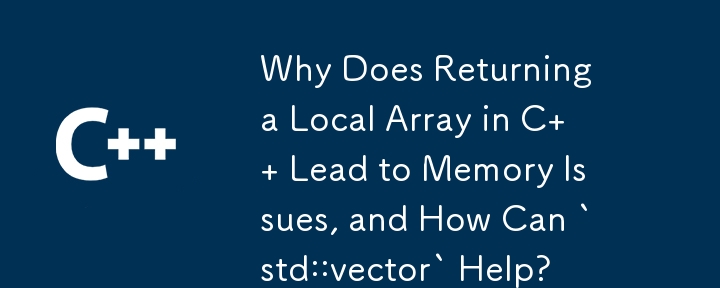 Backend Development
Backend Development
 C++
C++
 Why Does Returning a Local Array in C Lead to Memory Issues, and How Can `std::vector` Help?
Why Does Returning a Local Array in C Lead to Memory Issues, and How Can `std::vector` Help?
Why Does Returning a Local Array in C Lead to Memory Issues, and How Can `std::vector` Help?
Dec 03, 2024 am 04:13 AM
Passing Local Variables by Value: A Cautionary Tale
In C , declaring a local array and returning it can lead to compiler warnings. Consider the following code:
char *recvmsg() {
char buffer[1024];
return buffer;
}This code will likely trigger a warning like "warning C4172: returning address of local variable or temporary." This warning occurs because the pointer returned by recvmsg() points to an array that may cease to exist after the function returns.
A Better Alternative: std::vector
To avoid such warnings and ensure proper memory management, consider using std::vector instead of local arrays. std::vector is a dynamic array class that manages its own memory allocation, thus eliminating the need for manual memory management.
std::vector<char> recvmsg() {
std::vector<char> buffer(1024);
// ...
return buffer;
}This code can be safely returned and accessed in the main() function:
std::vector<char> reply = recvmsg();
If you require a char* pointer for compatibility reasons, you can obtain it from the std::vector using its data() method:
char *str = &reply[0];
Conclusion
By utilizing std::vector for local arrays, you can avoid memory-related issues and ensure proper data handling in your C applications. Remember that managing memory manually can introduce errors and should be avoided if possible.
The above is the detailed content of Why Does Returning a Local Array in C Lead to Memory Issues, and How Can `std::vector` Help?. For more information, please follow other related articles on the PHP Chinese website!

Hot Article

Hot tools Tags

Hot Article

Hot Article Tags

Notepad++7.3.1
Easy-to-use and free code editor

SublimeText3 Chinese version
Chinese version, very easy to use

Zend Studio 13.0.1
Powerful PHP integrated development environment

Dreamweaver CS6
Visual web development tools

SublimeText3 Mac version
God-level code editing software (SublimeText3)

Hot Topics
 C language function format letter case conversion steps
Mar 03, 2025 pm 05:53 PM
C language function format letter case conversion steps
Mar 03, 2025 pm 05:53 PM
C language function format letter case conversion steps
 What are the types of values returned by c language functions? What determines the return value?
Mar 03, 2025 pm 05:52 PM
What are the types of values returned by c language functions? What determines the return value?
Mar 03, 2025 pm 05:52 PM
What are the types of values returned by c language functions? What determines the return value?
 How does the C Standard Template Library (STL) work?
Mar 12, 2025 pm 04:50 PM
How does the C Standard Template Library (STL) work?
Mar 12, 2025 pm 04:50 PM
How does the C Standard Template Library (STL) work?
 What are the definitions and calling rules of c language functions and what are the
Mar 03, 2025 pm 05:53 PM
What are the definitions and calling rules of c language functions and what are the
Mar 03, 2025 pm 05:53 PM
What are the definitions and calling rules of c language functions and what are the
 Where is the return value of the c language function stored in memory?
Mar 03, 2025 pm 05:51 PM
Where is the return value of the c language function stored in memory?
Mar 03, 2025 pm 05:51 PM
Where is the return value of the c language function stored in memory?
 How do I use algorithms from the STL (sort, find, transform, etc.) efficiently?
Mar 12, 2025 pm 04:52 PM
How do I use algorithms from the STL (sort, find, transform, etc.) efficiently?
Mar 12, 2025 pm 04:52 PM
How do I use algorithms from the STL (sort, find, transform, etc.) efficiently?








